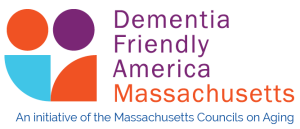DF Ambassadors
Dementia Friendly Massachusetts Ambassadors
Dementia Friendly Massachusetts currently contracts with individuals to augment DFM’s staff outreach to cultural and linguistic minority communities and leaders. A limited stipend is provided as part of the 2018 DFM Scale and Sustainability Grant awarded to the Massachusetts Councils on Aging by the Tufts Health Foundation.
DFM Ambassadors: Why?
The Alzheimer’s Association and other organizations and researchers have found that the presence of certain risk factors significantly increases a person’s vulnerability to developing the disease. These risk factors are found at a significantly higher rate in both the African American and Hispanic/Latino communities.
The most reliable indicators for increased risk of developing the disease are the so-called “vascular risk factors,” meaning medical conditions that impact the blood vessels. Vascular disease (poor circulation), stroke, high cholesterol, high blood pressure, and type Two diabetes are more prevalent among African-Americans and Latinos/Hispanics than among whites. The good news is that each of these risks factors is treatable and mid-life diagnosis and treatment of these risk factors may reduce the risk of developing dementia.
Educational attainment and income levels also inversely impact the likelihood of developing dementia. Lower levels of education and income appear to be correlated and suggest an increased risk of a dementia diagnosis. According to the Administration for Community Living (ACL), in 2014, 84 percent of African Americans persons 65 and older were high school graduates and 26 percent had a bachelor’s degree or higher. Hispanics have the lowest education levels of any group in the United States.
Age is the most significant risk factor for Alzheimer’s with 47% of persons 85 and older living with the disease. The impact of the disease by age does not appear to vary by race or ethnicity. However, Hispanics are disproportionately represented in the older age groups most at risk of Alzheimer’s disease. By the middle of the century, Hispanics will increase as a proportion of the total elderly population from 5% today to 16%.
The cultural characteristics of dementia in African American and Hispanic/Latino communities also impact the diagnosis and treatment of the disease. Individuals in both communities tend to be diagnosed at a later stage of Alzheimer’s disease — limiting the effectiveness of treatments that depend upon early intervention. This is caused in part by the high level of stigma attached to the disease, the greater likelihood that family members provide care at home due to, and, especially for Hispanics, a mistrust of the health care system. According to the Alzheimer’s Association, Hispanics are less likely than non-Hispanics to see a physician and much less likely to use services provided by other health professionals.
Another significant challenge facing African Americans and Hispanic/Latinos is their absence from on-going, large scale research on the impact of the disease on their communities as most research includes non-Hispanic whites as participants. This limited sample group impedes the amount of information readily at hand to fully understand the impact of the disease on these communities.
In short, African Americans and Hispanic/Latinos need extra assistance in developing strategies to make their communities more dementia friendly. DFM is committed to helping ALL communities, so we reached out through a Request for Proposals process to finds some extra help from people who are a part of those communities.
What does a DFM Ambassador Do?
DFM Ambassadors participate in monthly meetings of the Dementia Friendly Massachusetts (DFM) leadership team and help shape a statewide strategy to improve the inclusiveness of all communities in the DFM movement. They help identify strategies to help communities of color engage in and benefit from the dementia-friendly and age-friendly movements as well as work with the DFM leadership team to develop ideas to help other cultural or linguistic communities engage in and benefit from these movements. Ambassadors also help to identify groups or individuals with interest in DFM who need technical assistance, funding, or other resources to advance their dementia-related community activities.
